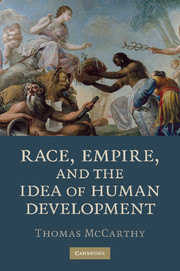Crossref Citations
This Book has been
cited by the following publications. This list is generated based on data provided by Crossref.
Honneth, Axel
Allen, Amy
and
Cooke, Maeve
2010.
A conversation between Axel Honneth, Amy Allen and Maeve Cooke, Frankfurt am Main, 12 April 2010.
Journal of Power,
Vol. 3,
Issue. 2,
p.
153.
Katzenstein, Peter
2010.
The West as Anglo-America: Plural and Pluralist.
SSRN Electronic Journal,
Hayden, Patrick
2010.
The Relevance of Hannah Arendt’s Reflections on Evil: Globalization and Rightlessness.
Human Rights Review,
Vol. 11,
Issue. 4,
p.
451.
2010.
Books Received.
Philosophy,
Vol. 85,
Issue. 1,
p.
169.
Balfour, Lawrie
2010.
Darkwater’s Democratic Vision.
Political Theory,
Vol. 38,
Issue. 4,
p.
537.
Vucetic, Srdjan
2011.
A Racialized Peace? How Britain and the US Made Their Relationship Special.
Foreign Policy Analysis,
Vol. 7,
Issue. 4,
p.
403.
Pavesich, Vida
2011.
The anthropology of hope and the philosophy of history: Rethinking Kant’s third and fourth questions with Blumenberg and McCarthy.
Thesis Eleven,
Vol. 104,
Issue. 1,
p.
20.
Adamson, Fiona B.
Triadafilopoulos, Triadafilos
and
Zolberg, Aristide R.
2011.
The Limits of the Liberal State: Migration, Identity and Belonging in Europe.
Journal of Ethnic and Migration Studies,
Vol. 37,
Issue. 6,
p.
843.
2011.
Max Horkheimer and the Foundations of the Frankfurt School.
p.
336.
Dufour, Frederick Guillaume
2012.
Marx et la tradition cosmopolite : l’actualité d’une tension.
Sociologie et sociétés,
Vol. 44,
Issue. 1,
p.
103.
Barabantseva, Elena
2012.
In Pursuit of an Alternative Model? The Modernisation Trap in China’s Official Development Discourse.
East Asia,
Vol. 29,
Issue. 1,
p.
63.
Schinkel, Willem
2013.
Regimes of Violence and theTrias Violentiae.
European Journal of Social Theory,
Vol. 16,
Issue. 3,
p.
310.
Allen, Amy
2013.
Feminism, Modernity and Critical Theory.
International Critical Thought,
Vol. 3,
Issue. 3,
p.
268.
Marwah, Inder
2013.
Elateres Motiva: From the Good Will to the Good Human Being.
Kantian Review,
Vol. 18,
Issue. 3,
p.
413.
Michel, Noémi
2013.
Equality and Postcolonial Claims of Discursive Injury.
Swiss Political Science Review,
Vol. 19,
Issue. 4,
p.
447.
Pavlich, George
2013.
Cape Legal Idioms and the Colonial Sovereign.
International Journal for the Semiotics of Law - Revue internationale de Sémiotique juridique,
Vol. 26,
Issue. 1,
p.
39.
Schulte, Barbara
2013.
Unwelcome stranger to the system: vocational education in early twentieth-century China.
Comparative Education,
Vol. 49,
Issue. 2,
p.
226.
Chandra, Uday
2013.
Liberalism and Its Other: The Politics of Primitivism in Colonial and Postcolonial Indian Law.
Law & Society Review,
Vol. 47,
Issue. 1,
p.
135.
Heaney, Robert S.
2013.
The Wiley‐Blackwell Companion to the Anglican Communion.
p.
726.
Jeffers, Chike
2013.
Embodying Justice in Ancient Egypt:The Tale of the Eloquent Peasantas a Classic of Political Philosophy.
British Journal for the History of Philosophy,
Vol. 21,
Issue. 3,
p.
421.





